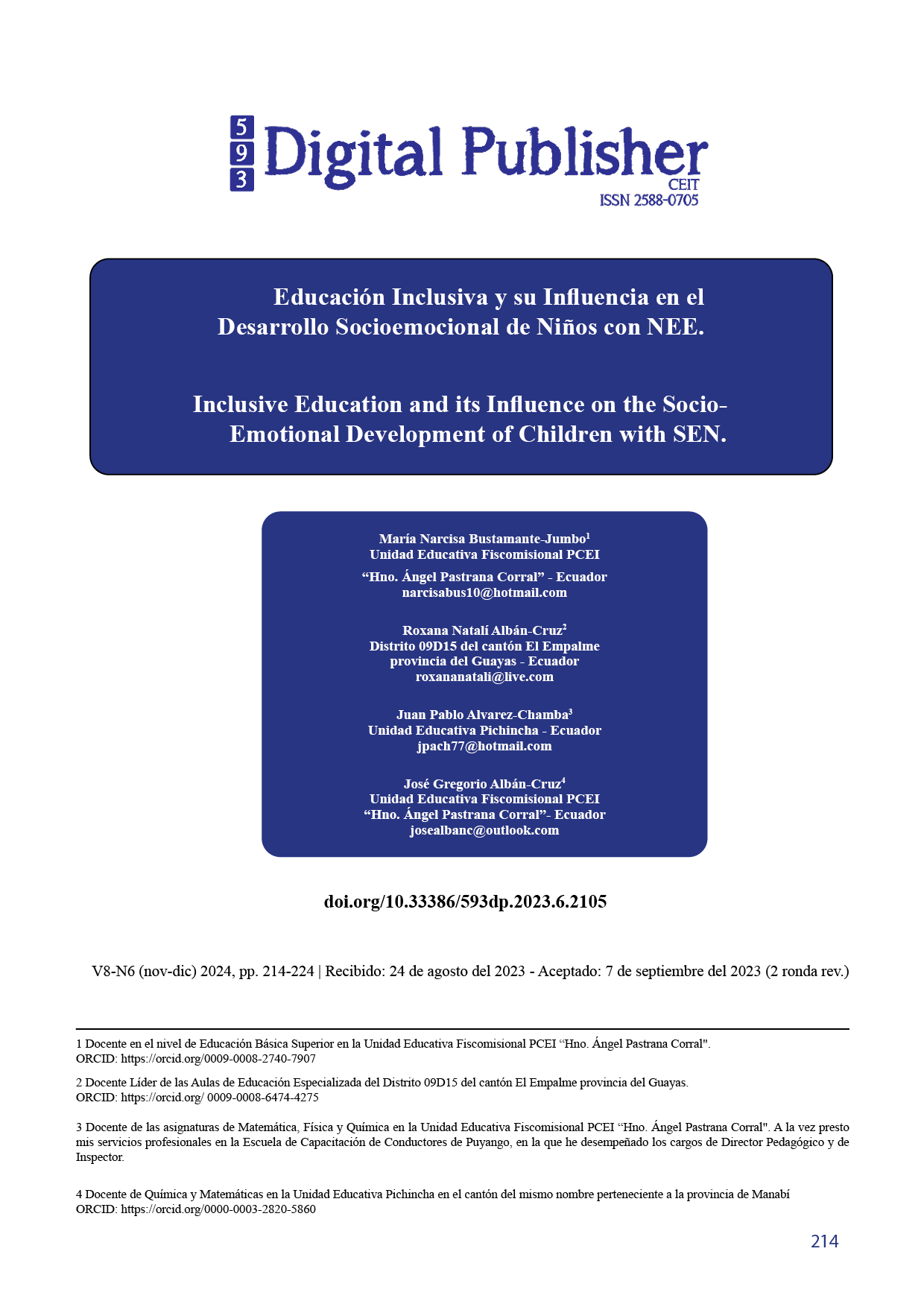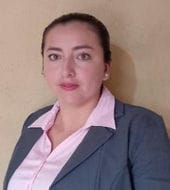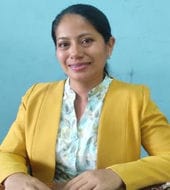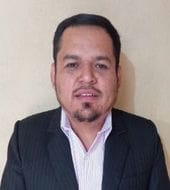Inclusive Education and its Influence on the Socio-Emotional Development of Children with SEN
Main Article Content
Abstract
Currently children with Special Educational Needs (SEN) are a group of students who require tools to be able to integrate, adapt and develop properly in the educational environment, the present work aims to determine the influence of inclusive education in the socio-emotional development of children with SEN associated with intellectual disability in regular education schools. The methodology applied is of a qualitative approach, by the inductive-deductive method, where data from an interview with seven teachers who work with children with SEN in a Empalme school were analyzed. Among the main findings, it was obtained that educational inclusion allows fostering respect for diversity and helps increase the empathy of students towards their peers who present SEN; The main elements that help is the application of inclusive educational strategies and plans, the development of skills and abilities to generate knowledge, presentation of didactic classes and encourage compliance with human values in the institution. It was concluded that inclusive education positively influences the socio-emotional development of children with SEN, since it seeks to provide relevant strategies and planning that meet the needs of all students in order to offer quality education to all students who They are vulnerable because of their status.
Downloads
Article Details

This work is licensed under a Creative Commons Attribution-NonCommercial-ShareAlike 4.0 International License.
1. Derechos de autor
Las obras que se publican en 593 Digital Publisher CEIT están sujetas a los siguientes términos:
1.1. 593 Digital Publisher CEIT, conserva los derechos patrimoniales (copyright) de las obras publicadas, favorece y permite la reutilización de las mismas bajo la licencia Licencia Creative Commons 4.0 de Reconocimiento-NoComercial-CompartirIgual 4.0, por lo cual se pueden copiar, usar, difundir, transmitir y exponer públicamente, siempre que:
1.1.a. Se cite la autoría y fuente original de su publicación (revista, editorial, URL).
1.1.b. No se usen para fines comerciales u onerosos.
1.1.c. Se mencione la existencia y especificaciones de esta licencia de uso.
References
Altamirano, K. (2018). Programa de Acompañamiento a Padres de Familia para Mejorar la Inserción Social de Estudiantes con Necesidades Educativas Especiales Asociadas a Discapacidad Intelectual, Trujillo - 2017. Obtenido de repositorio.ucv.edu.pe: https://repositorio.ucv.edu.pe/handle/20.500.12692/22642
Alvarez, E. (2020). Educación Socioemocional. Controversias y Concurrencias Latinoamericanas, 11(20), 389-401. Obtenido de https://www.redalyc.org/journal/5886/588663787023/588663787023.pdf
Arias, J., Villasís, M., & Miranda, M. (2016). El Protocolo de Investigación III: la Población de Estudio. Revista Alergia México, 63(2), 201-206. Obtenido de https://www.redalyc.org/pdf/4867/486755023011.pdf
Bolaños, E. (2020). Educación Socioemocional. Del Enfoque Regulatorio, al Crecimiento Personal y Social. Controversias y Concurrencias Latinoamericanas, 11(20), 388-408. Obtenido de https://ojs.sociologia-alas.org/index.php/CyC/article/view/163/196
Bolivar, A. (2019). Un Currículum Inclusivo en una Escuela que Asegura el Éxito para Todos. e-Curriculum, 17(3), 827-851. Obtenido de https://www.researchgate.net/publication/336125155_Un_curriculum_inclusivo_en_una_escuela_que_asegure_el_exito_para_todos
Cadena, P., Rendón, R., Aguilar, J., Salinas, E., De la Cruz, F., & Sangerman, D. (2017). Métodos Cuantitativos, Métodos Cualitativos o su Combinación en la Investigación: un Acercamiento en las Ciencias Sociales. Revista Mexicana de Ciencias Agrícolas, 8(7), 1603-1617. Obtenido de https://www.redalyc.org/pdf/2631/263153520009.pdf
Carmona, J., García , M., Máiquez, L., & Rodrigo, M. (2019). El Impacto de las Relaciones entre la Familia y la Escuela en la Inclusión Educativa de Alumnos de Etnia Gitana. Una Revisión Sistemática. Multidisciplinary Journal of Educational Research, 9(3), 319-348. doi:10.4471/remie.2019.4666
Clavijo, R., & Bautista, M. (2020). La Educación Inclusiva. Análisis y Reflexiones en la Educación Superior Ecuatoriana. Alteridad, Revista de Educación, 15(1), 113-124. doi:https://doi.org/10.17163/alt.v15n1.2020.09
Cuesta, J., Fuente, R., & Ortega, T. (2019). 85José Luis Cuesta, Raquel de la Fuente & Teresa OrtegaDiscapacidad intelectual: una interpretación en el marco del Discapacidad Intelectual: Una Interpretación en el Marco del Modelo Social de la Discapacidad. Controversias y Concurrencias Latinoamericanas , 11(18), 85-106. Obtenido de http://ojs.sociologia-alas.org/index.php/CyC/article/view/93/94
García, M., & Vegas, H. (2019). La Importancia de la Formación Integral en los Procesos de Inclusión de Estudiantes con Discapacidad Cognitiva. Revista de Ciencias Humanísticas y Sociales (ReHuSo), 4(2), 46-57. Obtenido de https://www.redalyc.org/pdf/6731/673171022009.pdf
Guerra, S. (2018). Los Estudiantes con Necesidades Educativas Especiales. Recursos y Apoyos para su Atención Educativa. Revista Electrónica en Educación y Pedagogía, 2(2), 51-66. Obtenido de https://www.redalyc.org/journal/5739/573962519003/573962519003.pdf
Hernández, P., & Samada, Y. (2021). La educación inclusiva desde el marco legal educativo en el Ecuador. Revista de Ciencias Humanísticas y Sociales, 6(3), 52-67. Obtenido de https://www.redalyc.org/journal/6731/673171199005/673171199005.pdf
Marchesi, Á., & Hernández, L. (2019). Cinco Dimensiones Claves para Avanzar en la Inclusión Educativa en Latinoamérica. Revista Latinoamericana de Educación Inclusiva, 13(2), 45-56. doi: http://dx.doi.org/10.4067/S0718-73782019000200045
Martinez, I. (2018). Gestión de la Educación Inclusiva para Niños/Niñas y Adolescentes, Asociadas a una Discapacidad. Elaboración de una Guía de Buenas Prácticas en Educación Inclusivas para los Docentes de la Unidad Educativa Fiscal Patria. Obtenido de www.lareferencia.info: https://www.lareferencia.info/vufind/Record/EC_993dc8e9c05e32b9e2b284b4333b5817
Martínez, M. (2020). Hacia una Educación Inclusiva: Formación del Profesorado de Primaria Enmarcada en los ODS que Potencian la Igualdad de Género. Revista Iberoamericana de Educación, 82(2), 27-45. Obtenido de https://redined.educacion.gob.es/xmlui/bitstream/handle/11162/197474/Martinez.pdf?sequence=1
Mendioroz, A., Rivero, P., & Aguilera, E. (2019). Una Propuesta de Formación Docente para Responder a las Altas Capacidades en la Escuela Inclusiva. Profesorado, Revista de Currículum y Formación del Profesorado, 23(1), 265-284. Obtenido de https://revistaseug.ugr.es/index.php/profesorado/article/view/9154/7679
Núñez, M., & Llorent, V. (2022). La Educación Inclusiva y su Relación con las Competencias Socioemocionalesy Morales del Profesorado en la Escuela. Aula Abierta, 51(2), 171-180. doi:https://doi.org/10.17811/rifie.52.2.2022.171-180
Paz, E. (2020). Inclusión Educativa del Alumnado en Situación de Discapacidad en la Educación Superior: una Revisión Sistemática. Ediciones Universidad de Salamanca, 32(1), 123-146. doi:https://doi.org/10.14201/teri.20266
Paz, E. (2020). Inclusión Educativa del Alumnado en Situación de Discapacidad en la Educación Superior: Una Revisión Sistemática. Revista Interuniversitaria, 32(1), 123-146. Obtenido de https://www.torrossa.com/en/resources/an/4608258
Pulido, M. (2015). Ceremonial y protocolo: métodos y técnicas de investigación científica. Opción, 31(1), 1137-1156. Obtenido de https://www.redalyc.org/pdf/310/31043005061.pdf
Quesada, M. (2021). Metodologías inclusivas y emergentes para la formación docente en inclusión educativa. Revista Internacional de Apoyo a la Inclusión, Logopedia, Sociedad y Multiculturalidad, 7(2), 110-117. Obtenido de https://revistaselectronicas.ujaen.es/index.php/riai/article/view/6363/5610
Ramírez, P. (2019). Adaptaciones Curriculares en Aulas Inclusivas. Un Estudio comparativo entre Instituciones Educativas Particulares Católicas y Laicas de Educación Primaria de la Ciudad de Lima. Obtenido de repositorio.unife.edu.pe: https://repositorio.unife.edu.pe/repositorio/bitstream/handle/20.500.11955/670/Ramirez%20Talledo%20PM_2019.pdf?sequence=1&isAllowed=y
Sánchez, T., Fuertes, D., Padilla, E., Aldawsari, N., & Andrade, G. (2022). Estrategias Activas desde la Complejidad y su Efecto en la Educación en Estudiantes con NEE, en la Ciudad de Quito-Ecuador. Serie Científica de la Universidad de las Ciencias Informáticas, 15(9), 82-93. Obtenido de https://dialnet.unirioja.es/servlet/articulo?codigo=8955505
Silva, M. (2020). La Dimensión Pedagógica de la Equidad en Educación Superior. Archivos Analíticos de Políticas Educativas, 28(46), 1-30. Obtenido de https://dialnet.unirioja.es/servlet/articulo?codigo=7444004
Simón, C., Barrios, Á., Gutiérrez, H., & Muñoz, Y. (2019). Equidad, Educación Inclusiva y Educación para la Justicia Social. ¿Llevan Todos los Caminos a la Misma Meta? Revista Internacional de Educación para la Justicia Social, 8(2), 17-32. Obtenido de https://repositorio.uam.es/bitstream/handle/10486/690151/RIEJS_8_2_2.pdf?sequence=1&isAllowed=y
Vélez, M., San Andrés, E., & Pazmiño, M. (2020). Inclusión y su importancia en las instituciones educativas desde los mecanismos de integración del alumnado. Revista Arbitrada Interdisciplinaria Koinonía, 5(9), 5-19. Obtenido de https://www.redalyc.org/journal/5768/576869060001/576869060001.pdf
Ventura, J. (2017). ¿Población o Muestra?: Una Diferencia Necesaria. Revista Cubana de Salud Pública, 43(4), 648-649. Obtenido de https://www.redalyc.org/pdf/214/21453378014.pdf
Zavala, M. (2019). La Atención Integral a Niños con Discapacidad Intelectual y su Influencia en el Desarrollo de su Autoestima. Obtenido de repositorio.ulvr.edu.ec: http://repositorio.ulvr.edu.ec/bitstream/44000/2982/1/TM-ULVR-0093.pdf





